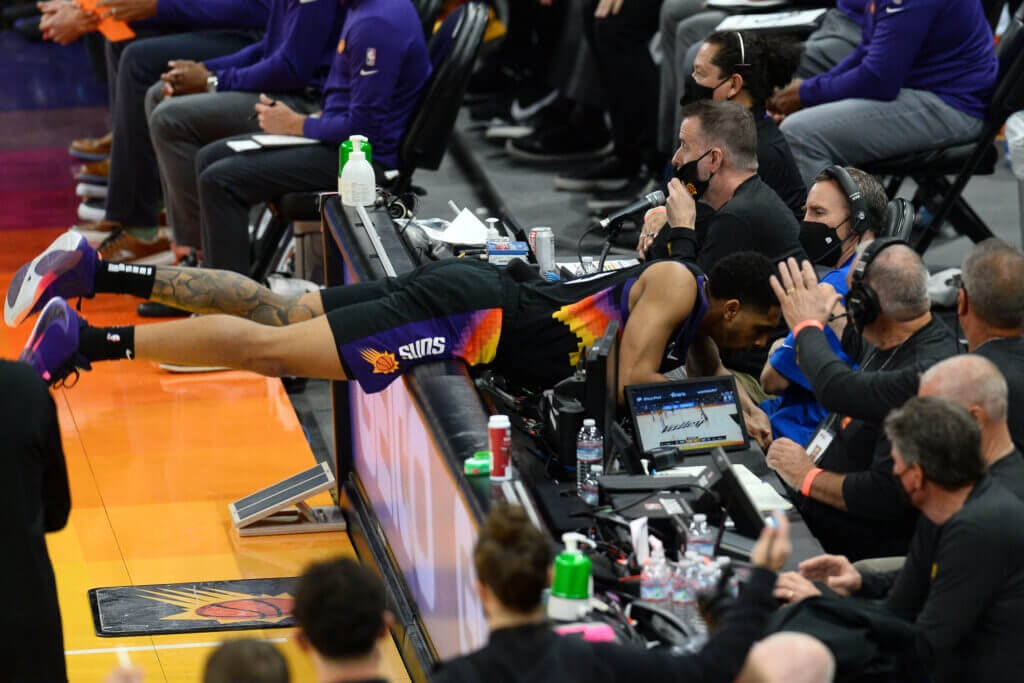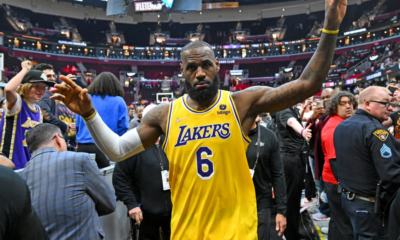
In just a few hours this weekend, Grizzlies center Jaren Jackson Jr. A viral Reddit post implicated Grizzlies scorekeepers in a conspiracy to record every borderline call when Jackson steals or blocks shots to improve his Defensive Player of the Year case. It quickly went viral before being debunked by reporters who saw footage of Jackson’s block and the league itself. (Reddit now labels this post as “misleading”.)
The story underscored how quickly fascinating misinformation can spread, and how good Jackson actually is on defense. I also showed that there is no
no score keeper NBA As the Reddit post claims, the four-man team communicates directly with league officials throughout the game to create the stats and play-by-play data seen in box scores.
In order to better understand the process of athletic interviewed the former scorekeeper who worked for two different NBA teams over the nine years of the 2010s. We gave him anonymity, so he said he might have better stats on the process, what really happened, and why Jackson played in Memphis instead of the road trip. We were able to speak frankly about whether there was any reason not to be malicious.
(This interview is an edited summary of the 30-minute conversation for clarity.)
What is your impression of what people think about scoring, and how wrong are they?
The image I grew up with is that of a stocky old man in a sweater vest sitting courtside with one of the giant score-keeping notebooks. But it’s actually a little more complicated than that.
So what does it actually look like?
Every NBA game has an official scorer. That person’s sole responsibility is to maintain official scores and fouls. They sit courtside and talk to the referee and he puts up six fingers if someone fouls. What that person does has nothing to do with the stats posted on NBA.com.
Each arena has a crew of four who are either part-time employees or team contractors. They are really separate from any part of the organization. I have an input. He and the spotter wait for the action of the game to occur. There is a touchscreen laptop and the spotter calls out everything that happens on the court. The person typing it into the system.
There’s a third party, a secondary entrant, who’s basically sitting by the spotter and listening. He or she is basically listening and editing in real time. They are the first backstop to mistakes. The secondary spotter also controls her DVR on the available (has it) monitor.
So, is it used to reconfirm in real time the plays that could not be cleared immediately?
yeah, exactly. It looks like this: Can you pull it over and check it? ’ And they will see it. If it’s close, my experience is that the whole team looks and says, “Hey, do you think this is blocking? Do you think this is stealing?”
It goes very slowly like frame by frame and you can see who touched it last and what really happened.
right. In Dallas, you’ll see a media member sitting right behind the scorekeeper and using his monitor for this replay throughout the game.
I’ve done stats for every sport, but the NBA is the only sport I’ve done stats for, because they’re the best athletes on a ridiculous level. Elite of elites, they move very quickly (and) have a lot going on. It’s a very fast-paced game. We’re just humans and we don’t immediately understand what’s going to happen, so there’s a lot we need to go back and double-check.
OK, we have spotters, inputs and sub-inputs. Who was his fourth person involved in the scoring process?
In 2017, the NBA began taking a more even view of keeping stats. This was probably at the same time as the (embrace) of fantasy, gambling, etc.
Part of that included a fourth person in the crew using a headset with someone from Secaucus (the league office). They act as intermediaries between Secaucus and the Stats Crew. Depending on the game, it’s a pretty tedious job. They are often helping out secondary entrants or providing input in times of crisis. But that person is in contact with Secaucus, and there are people out there watching the progress of the game. They might point out, “Hey, I think this could be an assist, it could be a steal.” This is fairly new to scorekeeping operations.
So what role did you work in when you worked in this operation?
I mostly did secondary input (when I worked on the Western Conference team) and occasionally spotter. Our primary entrant never missed a game, but I was the backup (when he did). (Eastern he was on the conference team) I was mostly the primary input person. I found and did the primary. And perhaps once in a new role as the person who speaks to Secaucus.
Never worn a sweater vest?
I probably wore sweaters at different times. I don’t think I’ve ever owned a complete sweater vest.
What does this look like in practice from an employment perspective?
None of them are full-time jobs. Most of the time, in my experience, that talent pool comes from the sports informatics department of a nearby university. Whether they started with that and did something else, but continued with the scoring job as a sideline, or are they still working in the sports information department. Everyone I worked with started out that way. Because you know how to keep game stats and probably underpaid. Extra cash is fine.
What’s the hardest play to decide on?
I think it must be an assistant.
I’ve always understood that it applies if a player scores less than 2 dribbles after receiving a pass. How accurate is that?
That’s something I heard at some point too, and probably was a few years ago. The person who made it and scored it goes directly to the basket or shoot. There is no end point in basketball movement. There’s probably some wiggle room there, but it’s the kind of (action) that quickly leads to some kind of (made shot) without any special basketball moves.
(I remember watching a YouTube clip ofChris Paul With 15 assists for New Orleans, he’s always been a no-nonsense scorekeeper. I was always very aware that whatever I was doing would be seen. For the crew I worked with, it was always a matter of pride that we weren’t stat-padding.
So the reason we’re talking is because this[Jaren Jackson Jr.]steals and blocks controversy.
In my experience, we all want to get it right. Also, I don’t think NBA players are quiet about when to block shots or get pieces. I haven’t gone back and watched Jaren Jackson Jr.’s videos, but after a few of them, I think he either got the piece or said something.
In many of these cases, by default, it’s easy to double-check. If I was closer, I’d have a better look. For example, let’s say (his one player on the Western Conference team taking the stats) contested the shot. And if the shot didn’t end where you thought it was from that player, but you weren’t entirely sure if (that player) got the piece, check if they got the piece. Look again to see. Don’t miss anything. In many cases it is familiar.
These replays are very easy to watch, especially if you’re pulling up frame by frame. can find.
How often did you communicate directly with players or people on the team lobbying for players? Was it common?
So they weren’t supposed to tell us about statistics and they usually kept to it. It was definitely the players who pointed things out.
I’ve had[publicists]from both teams say to me, ‘Could you take a look at this just in case?’ But it was very rare because the team wasn’t supposed to converse with us. It happens, but not very often in my experience. The two teams I worked for generally respected that rule.
So why is it now so difficult for home scorekeepers to actually maintain stats in a biased way?
From my experience, I would give the people I work with the benefit of the doubt. Additional lines to fix. If you give them what they think is (not exactly) they will let you know. In my experience, you need a good explanation as to why you disagree with what they say.
Finally, the NBA will come back and review after the game. They came back and were tracking, I’m not sure if they do live audits anymore, but I was told they were tracking statisticians based on post-match audits. Go back to the game at the end with the play-by-play (log) and go through all the plays. If I screw something up, I get an email saying, “Hey, your team missed this, so it was retroactively changed to this call.” I’m proud to say that in the crew I was on, that was very rare.
Each scorekeeper, we must sign a non-gambling pledge. They do background checks every year. So a lot is done to protect the integrity of this stuff.
Do you have any theories as to why Jaren Jackson Jr. has better numbers at home? steal things that might otherwise have gone unnoticed.
I’m sure that could be one reason. They may be more eager to go back and double check, but even auditors may not be able to pull up every angle and slow each one down. Hmm.
What you’re suggesting is that it’s very likely that some of these are very small. I have. They can certainly take the time to take care of it.
(Top photo: Joe Camporeale / USA Today)















